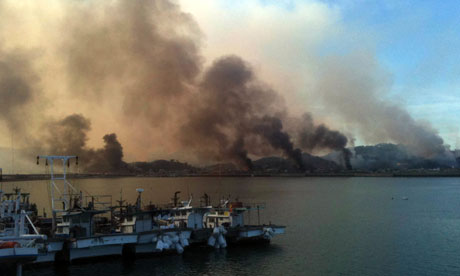North and South Korea to hold military talks
by editor | 2011-01-21 9:25 am
![]()
Meetings could pave way for resumption of six-country negotiations on Pyongyang’s nuclear programme
Justin McCurry
-

North Korea’s attack on Yeonpyeong island raised tensions with the South. Photograph: Yonhap/AP North and South Korea have agreed to hold high-level military talks next month after coming under pressure from the US and China to ease tensions.
The talks, the first between the countries’ defence ministers since late 2007, could pave the way for the resumption of multinational negotiations on North Korea’s nuclear weapons programme.
Those negotiations – involving the two Koreas, China, the US, Russia and Japan – have not been held since North Korea walked out in April 2009. The Pyongyang regime has since conducted a second nuclear test and there are reports it may be planning a third this year.
The relaxation of tensions follows a report that Barack Obama, had warned his Chinese counterpart, Hu Jintao, that Washington would redeploy forces in Asia unless Beijing reined in North Korea, an ally and major recipient of Chinese aid.
During their summit in Washington this week, Obama persuaded Hu to take a harder line against North Korea, the New York Times quoted a senior US administration official as saying.Mark Toner, a US state department spokesman, said the inter-Korea talks were a welcome sign that North Korea was distancing itself from its “belligerent” actions of the past.
Previous low-level negotiations broke down after North Korea’s torpedo attack in March on the Cheonan, a South Korean navy vessel. Pyongyang denies any involvement in the incident, in which 46 sailors died.
In November North Korea shelled Yeonpyeong, an island near the countries’ disputed maritime border in the Yellow Sea.
Two marines and two civilians were killed in the attack, the worst since the end of the 1950-53 Korean war. North Korea said it had launched the bombardment in response to “provocative” South Korean military manoeuvres in the area.
South Korea agreed to resume bilateral defence talks after the North offered to take “responsible measures” over the Cheonan and Yeonpyeong incidents and promised to refrain from provocative actions.
The South reportedly plans to propose separate talks to put pressure on its neighbour to commit to previous agreements to dismantle its nuclear programme.
In November, it emerged that North Korea had made more progress in enriching uranium than previously thought.
It is known to have enough fissile material from its plutonium-based programme to make six to 12 nuclear bombs, but has not shown it has a working nuclear weapon.
Siegfried Hecker, a Stanford University professor who was shown around an enrichment plant at North Korea’s main nuclear facility at Yongbyon, said it contained an “astonishingly modern control room” overlooking 2,000 centrifuges.
Pyongyang’s minister for the armed forces suggested next month’s meeting in a letter to the South Korean defence minister, according to North Korea’s KCNA news agency. “The Korean peninsula is at the crucial crossroads to war or peace,” the agency said.
North Korean state-run television said: “[The letter says] we are in firm position to hold the North-South high-level military talks to solve all pending military issues. [It] also says we will express our opinions on the Cheonan incident and shelling on Yeonpyeong island at the talks to ease military tensions on the Korean peninsula.”
South Korean media welcomed the prospect of direct talks, but warned progress would hinge on Pyongyang’s readiness to apologise for the Cheonan and Yeonpyeong attacks.
The Chosun Ilbo newspaper said: “The upcoming dialogue will be an important opportunity to determine whether inter-Korean relations can be fundamentally transformed. If the North continues to deny any guilt over the attacks or proposes unacceptable terms, no progress can be made.”
Source URL: https://globalrights.info/2011/01/north-and-south-korea-to-hold-military-talks/